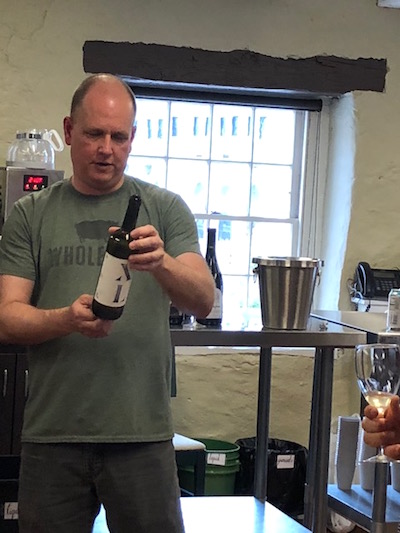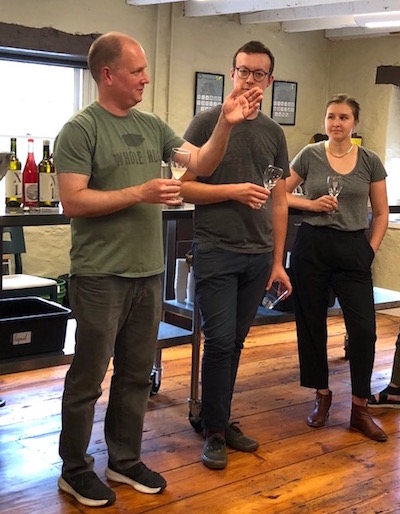It was a quarter past the hour by the time we all gathered in the lab to begin our second Sensory Series event of the summer, comparing natural wines and natural coffees.
“I like to start with a sparkling wine,” opened Howard Mahady, co-owner of Campus Fine Wines and the natural wine guide for the evening, as he poured generous sample servings to each guest. “It’s hard to be upset when you’re drinking something bubbly,” he grinned.
Over the next hour, we tasted six natural wines ranging from that light, fizzy white to a berry-forward rosé and a wine made from vines that had been surviving in France since the 1800s.

“I like to start with a sparkling wine,” said Howard. “It’s hard to be upset when you’re drinking something bubbly.”
As we drank, Howard addressed the questions of the assembled guests. What is a natural wine? Answer: Organic and biodynamic growing practices, natural yeasts and minimal amounts of sulfur and other additives. How can you tell if a wine is a natural? The short answer: You can’t, unless you know the importers that typically import natural wines. (More on that later).
In response to Howard, InterAmerican Quality Control Coordinator Amanda Armbrust-Asselin curated three flights of coffees that illustrated the effects of natural processing. Natural processing in coffee entails laying coffee cherries out in the sun to dry before separating the bean from the pulp. This process of fermentation introduces new flavors and creates uniquely fruity coffees. Conversely, washed processing separates the bean from its outside fruit layer before drying and results in cleaner and more balanced cup profiles.
The coffees we tasted demonstrated different flavors and mouthfeels that resulted from their processing methods. We tasted two coffees from the same region—one washed, one natural—as well as a variety of special processes that all fall under the umbrella of natural coffees.
One that stood out was the Kenya Endebess Estate Natural (which is set to arrive mid July). It boasts a pointed and juicy acidity, a clean finish and a silky body, along with notes of blueberry, lime, melon and dark chocolate.
Another palate-pleasing experience was a Brazilian coffee processed using semi-carbonic maceration, a process born out of wine-making. In the wine world, carbonic maceration refers to allowing the weight of the grapes to slowly breakdown the whole, instead of crushing the fruit by force. In wine, coffee cherries are washed and then placed in a stainless-steel tank filled with water; carbon dioxide is pumped into the tank until it replaces all the oxygen, and the cherries are then soaked at a very carefully controlled temperature. The absence of oxygen allows the coffee to macerate and ferment in a controlled environment and creates a distinctive, and reproducible, flavor.

Howard Mahady, co-owner of Campus Fine Wines; a guest; and IAC Quality Control Coordinator Amanda Armbrust-Asselin
During the tasting, we sampled both a coffee and a wine that were processed in this method. Both demonstrated similar characteristics of rustic fruitiness and a pleasant leathery, gamey taste.
Our guests included both seasoned coffee-industry friends and local Rhode Islanders with little coffee experience. For Providence native Joelle, the event was eye opening. Whereas before she had never thought of coffee outside its place in her cup, “Now that I have more background information about the process, I won’t look at my daily cup of coffee the same way,” she said.
Rachel Niemi from A&E Coffee and Tea commented on the way that wines boast the importer on their labels. This helps savvy consumers to identify good-quality wines, especially naturals, which often have small production lots and players changing frequently, by knowing the importers who curate quality. As Rachel, a coffee professional, pointed out, such a system could work effectively in coffee as well.
The end of the evening found us all still in the lab, digging into an array of cheeses and fruits and ensuring no drop of wine or coffee went to waste. The sun set lazily on the canal as many a good conversation buzzed around the room.
Next month, please join the Providence team for the third installment of our Sensory Series. Details coming soon! •
—
Victoria Brown is the QC Intern at IAC’s Providence office. While new to the world of coffee, she studied food history and food policy at Sarah Lawrence College. In her spare time she enjoys reading, knitting, drawing and cooking. Her full portfolio can be found at: https://www.clippings.me/victoriaabrown